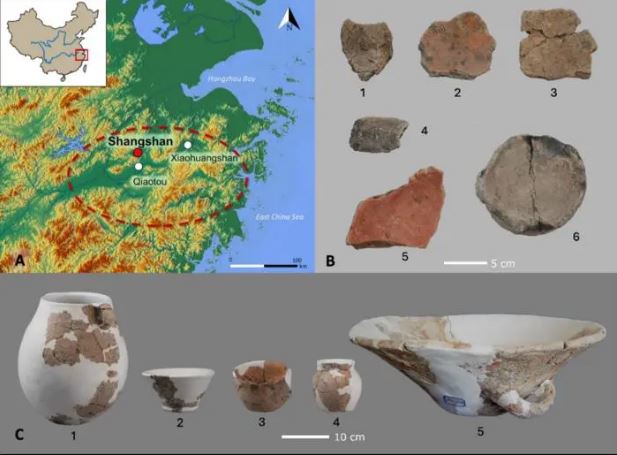RESEARCHERS have found the world’s oldest beer that they say was likely used for ancient boozy parties and ritualistic purposes 10,000 years ago.
The discovery of rice beer fermentation in China is the first known example of alcohol processing ever used, dating back to the Neolithic period.
IGGThe rice beer was likely used in a similar way to how we use it now, as a way of socially bonding with people[/caption]
A team examined twelve ancient pottery fragments in the Zhejiang Province to analyse millennia-old life forms, like plant and fungal remains, trapped in the residue left on the inside of the pots.
This also includes the dirt surrounding the pottery, from which they were able to unlock a boozy secret dating back to 10,000-9000 BP (Before the Present).
Jiang Leping from Zhejiang Provincial Institute of Cultural Relics and Archaeology believes that these pottery shreds had many different uses with integral cultural importance.
He said: “These shreds were associated with various vessel types, including those for fermentation, serving, storage, cooking, and processing.”
The researchers also found evidence of fungi, like Monascus moulds and yeast, on the pottery.
These fungi are often used in traditional Chinese brewing methods, suggesting that the ancient people made fermented drinks.
All of this suggests that the ancient Shangshan people were skilled farmers who grew a variety of crops, including rice.
It also implies that they knew how to make alcoholic drinks using rice and special fungi, which they brewed in specific types of pottery.
In ancient China, rice beer likely held significant social and cultural importance.
It may have been used in rituals, celebrations, and as a form of social bonding.
The findings give scientists the potential to uncover more about the time period, learning about people’s diets for example.
Professor LIU Li from Stanford University, the first author of the research paper, further pointed to the additional information this discovery could give, such as the kinds of conditions used to ferment rice beer.
Professor LU commented: “Domesticated rice provided a stable resource for fermentation, while favorable climatic conditions supported the development of qu-based fermentation technology, which relied on the growth of filamentous fungi.”
The humid climate of the early Holocene is thought to have provided ideal conditions for the growth of fungi, which is essential for the fermentation process.
WORLD’S OLDEST CHEESE
China has been the home of several ancient discoeries.
The Sun reported on the world’s oldest cheese in September, that was found buried beside a mummy.
DNA analysis found it was made with cow and goat milk and it is thought to be one of the first examples of the trendy probiotic, kefir.
Professor Qiaomei Fu, of the Chinese Academy of Sciences, said: “This is the oldest known cheese sample ever discovered in the world.
“This is a rare and valuable opportunity as food items like cheese are extremely difficult to preserve over thousands of years.
“Studying the ancient cheese in great detail can help us better understand our ancestors’ diet and culture.
“We’ve gained a clearer picture of ancient human life and their interactions with the world.
“This is just the beginning and we hope to use this technology to explore other previously unknown artefacts.”
Many traces of prehistoric cheese have been found around the world but they are often chemical traces left on tools or crockery, instead of lumps of the stuff.
Proof of humans making it are estimated to date back more than 7,000 years.
SWNSThe discovery shocked scientists because cheese is difficult to preserve over such a long time period[/caption]
SWNSThe cheese was made with cow and goat milk[/caption]
IGGTwelve ancient pottery fragments were examined as part of the research[/caption]
Leave a comment








